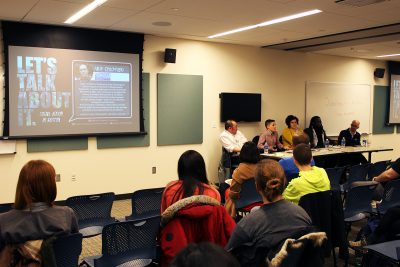
Boston University’s College of Arts and Sciences hosted a question and answer panel of local social action organizers on Tuesday night. “Let’s Talk About It: Social Action in Boston” gathered representatives from the Massachusetts Transgender Political Coalition, the Boston Knapsack Anti-Racism Group, Resource Generation, Empowering People for Inclusive Communities and the American Civil Liberties Union of Massachusetts.
Topics ranged from panelists and students talking about their personal experiences in social action to discussing interconnectivity within organizations. Stacy Ulrich, the director of Student Programs and Leadership at BU, brought panelists to the Yawkey Center for Student Services to exchange thoughts and ideas among students. Ulrich also teaches FY103, a student program and leadership class at BU, and originally coordinated this talk as a wrap-up of the semester for her students.
“It’s important because I think there’s ways students can get involved in political activism in and outside of their major and their usual academic lives,” Ulrich said.
What began as a way to end a class for the spring semester turned into a chance for BU students to learn more about social action and how they can incorporate topics such as interconnectivity in university groups.
Several students attended the panel to gain clarity on issues about social action from local organizers.
“A lot of us are still stuck in a haze where we don’t know what we can do but we see the problems that are arising in our communities,” said Lul Mohamud, a sophomore in CAS. “… As young people we want to mobilize, but right now we don’t know how. Like, we have a car, but we don’t know how to drive it.”
The room brought together a diverse group including dozens of BU students, some of whom are already involved in social action and others who came to learn how to be a part of social change.
“When I first came here [to BU] I didn’t know really how to go about getting involved,” said Claire Grossi, a freshman in CAS.
Grossi said that she was encouraged by the different groups represented on the panel and believes events like these give students the space to branch out and learn how to approach social change that really matters to them.
The city of Boston has a number of social action organizations that focus on interconnectivity within groups. Interconnectivity, discussed throughout the evening at the Yawkey Center, focuses on emphasizing the need for organizations to advocate for every minority.
Focusing on creating action is what interested so many of the students attending. For Kirstin Buchanan, a sophomore in CAS, the goal of the event was to “bring the conversation to BU through a course and events like this,” she said, “and then potentially turning the discourse into action.”
Buchanan was one of several students staffing the discussion and spoke of the social action course that gave rise to the talk. She underscored, as did panelists, the need for students to follow through on their desire to be involved in social action. To talk about it and then begin to work with others on social change is an integral step-by-step process, she said.
The name of the event, “Let’s Talk About It,” highlighted the stepping stone needed in social action, Ulrich said after the panel.
“More folks need to be having the conversation at the very least,” panelist Michael Martin, a co-organizer of Boston Knapsack Anti-Racism Group, also said after the panel. “If we can’t get the administration to do it, maybe we can get the student body to do it.”
For everyone to voice their ideas and experiences to each other will allow that social change to begin to take shape, he said, whether it be at BU or elsewhere via nonprofit organizations.
For organizers, the discussion promoted the growth of student understanding.
“[The goal is to] have our students examine their own ideas,” Ulrich said, “and how they can work toward social justice.”























































































































